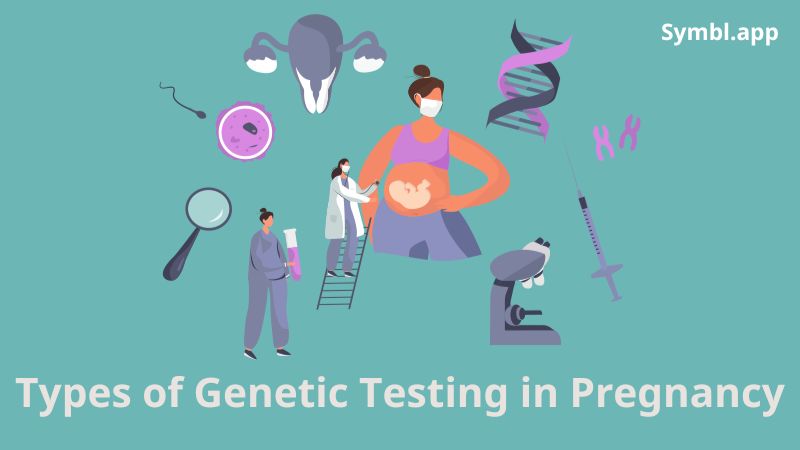Genetic testing during pregnancy has revolutionized prenatal care, offering valuable insights into the health and development of the fetus. With advancements in medical technology, there are various types of genetic testing available to expectant parents. In this comprehensive guide, Symbl.app delve into the types of genetic testing in pregnancy options, highlighting their purposes, procedures, and significance in prenatal care.
Types of Genetic Testing in Pregnancy
Carrier Screening:
One of the fundamental types of genetic testing in pregnancy is carrier screening. This initial step involves analyzing the genetic makeup of both parents to identify whether they carry gene mutations associated with specific genetic disorders. By understanding their carrier status, parents can ascertain the risk of passing on genetic conditions to their offspring. Carrier screening offers invaluable insights into the genetic landscape of the family, guiding informed decisions regarding pregnancy management and potential interventions.
Non-Invasive Prenatal Testing (NIPT):

Non-Invasive Prenatal Testing, or NIPT, represents a significant advancement in prenatal genetic screening. This non-invasive procedure involves analyzing cell-free fetal DNA circulating in the mother’s bloodstream. NIPT can detect chromosomal abnormalities, including Down syndrome (trisomy 21), Edwards syndrome (trisomy 18), and Patau syndrome (trisomy 13), as well as sex chromosome anomalies. Typically conducted between 10-13 weeks of pregnancy, NIPT offers early and accurate insights into fetal genetic health, empowering parents with knowledge to make informed decisions regarding pregnancy management.
Ultrasound:
While not strictly a genetic test, ultrasound imaging plays a crucial role in prenatal care by providing valuable insights into fetal development. During ultrasound examinations, healthcare providers can detect physical abnormalities or markers associated with genetic conditions. Additionally, ultrasound enables the estimation of gestational age, assessment of fetal growth, and detection of structural anomalies. This imaging modality complements genetic testing, offering a comprehensive approach to prenatal assessment and care.
Chorionic Villus Sampling (CVS):

Chorionic Villus Sampling, commonly referred to as CVS, is a diagnostic genetic test performed during early pregnancy. This procedure involves sampling a small piece of placental tissue (chorionic villi) to analyze fetal chromosomes. CVS can diagnose chromosomal abnormalities and certain genetic disorders, such as cystic fibrosis, Tay-Sachs disease, and sickle cell anemia. Typically conducted between 10-13 weeks of pregnancy, CVS provides valuable insights into fetal genetic health, enabling early detection and informed decision-making.
Amniocentesis:
Amniocentesis emerges as another pivotal diagnostic tool employed during pregnancy to evaluate the genetic well-being of the fetus. This procedure entails the extraction of a minute quantity of amniotic fluid, which envelops the fetus, for subsequent chromosomal analysis. Through amniocentesis, healthcare professionals can diagnose an array of conditions, including chromosomal aberrations, neural tube defects, and specific genetic disorders. Typically conducted between the 15th and 20th weeks of gestation, amniocentesis furnishes extensive data regarding fetal genetic health, thereby informing decisions related to pregnancy management and potential therapeutic interventions.
Expanded Carrier Screening:
Expanded Carrier Screening (ECS) stands as a multifaceted strategy within the realm of genetic testing during pregnancy. Distinguished by its thoroughness, ECS scrutinizes an extensive array of genetic conditions potentially harbored by parents, thereby shedding light on the likelihood of transmitting genetic disorders to their progeny. Through the discernment of potential genetic susceptibilities, ECS facilitates informed deliberations regarding family planning and the orchestration of prenatal care strategies. By equipping expectant parents with a comprehensive understanding of their genetic landscape, ECS fosters a proactive approach to healthcare decision-making, empowering individuals to navigate pregnancy with knowledge and foresight.
Fetal MRI:

In certain scenarios, fetal magnetic resonance imaging (MRI) serves as a valuable tool in evaluating fetal growth and identifying structural irregularities. While not classified as a genetic test, fetal MRI yields intricate visualizations of the fetus, facilitating the detection of possible genetic disorders or anomalies. This imaging technique serves as a complementary approach to genetic testing, furnishing supplementary data to inform prenatal healthcare strategies and decision-making processes. By offering detailed insights into fetal development, fetal MRI enhances the diagnostic capabilities of healthcare providers, ultimately optimizing prenatal care and management protocols.
Preimplantation Genetic Testing (PGT):
Preimplantation Genetic Testing, or PGT, is a specialized form of genetic testing utilized in conjunction with in vitro fertilization (IVF). This procedure involves testing embryos created through IVF to identify genetic abnormalities before implantation. By selecting embryos without specific genetic disorders for transfer, PGT reduces the risk of passing on genetic conditions to offspring. This advanced technique empowers couples undergoing fertility treatment with the opportunity to achieve a healthy pregnancy and mitigate the risk of genetic disorders.
Conclusion:
In conclusion, the types of genetic testing in pregnancy encompasses various modalities aimed at assessing fetal genetic health and guiding informed decision-making. From carrier screening to non-invasive prenatal testing, diagnostic procedures such as CVS and amniocentesis, and advanced techniques like expanded carrier screening and preimplantation genetic testing, expectant parents have access to a range of options tailored to their specific needs and circumstances. By leveraging these tools, healthcare providers can offer personalized prenatal care, empowering families with knowledge and support throughout their pregnancy journey.
